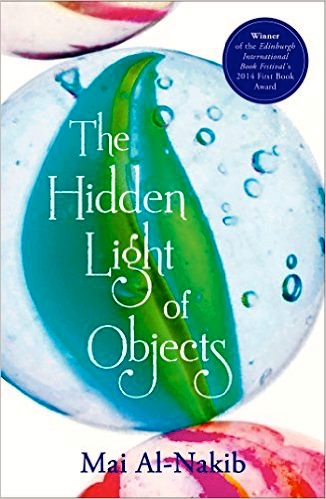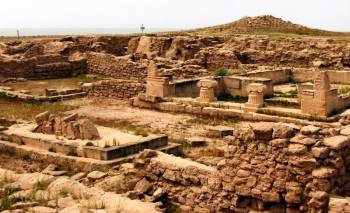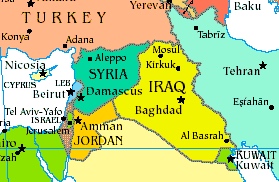Note: This book was WINNER of the Edinburgh International Book Festival’s First Book Award in 2014.
“It’s dark and the December air is cool and crisp as a Chinese apple. Nothing big happens on this night, though electricity tingles all around us…The band plays…It’s background noise to the temptation strung all around like paper lanterns or popcorn, hanging there for the taking. We don’t take enough, the arrogance of youth, and now look at us in our corner of the world, shattered in shards. Once there was still mischief to be had and we were safe as crystal dreams.”—from Vignette #I.
 The quotations which begin my reviews are always chosen to represent the author’s style and some of his/her ideas, but few have ever captured the unique qualities of a book as well as this one. Mai Al-Nakib, an author from Kuwait who got her PhD. in English literature from Brown University, knows how to capture an American audience, and her descriptions and her narrative style in this remarkable collection of stories are so attuned to her characters and subjects that readers will actually experience – not just “learn about” – parts of the world which most of us know only second-hand. Set in Kuwait, Lebanon, and Palestine, and, through the travel of some of these characters, in Japan and Greece, her stories are filled with word pictures so vivid that many readers will come close to feeling the reality of day-to-day life in these places. She opens new worlds, and by the time the collection closes, many readers will be viewing life in these parts of the world with clearer vision and greater empathy.
The quotations which begin my reviews are always chosen to represent the author’s style and some of his/her ideas, but few have ever captured the unique qualities of a book as well as this one. Mai Al-Nakib, an author from Kuwait who got her PhD. in English literature from Brown University, knows how to capture an American audience, and her descriptions and her narrative style in this remarkable collection of stories are so attuned to her characters and subjects that readers will actually experience – not just “learn about” – parts of the world which most of us know only second-hand. Set in Kuwait, Lebanon, and Palestine, and, through the travel of some of these characters, in Japan and Greece, her stories are filled with word pictures so vivid that many readers will come close to feeling the reality of day-to-day life in these places. She opens new worlds, and by the time the collection closes, many readers will be viewing life in these parts of the world with clearer vision and greater empathy.
 In the quotation which begins this review, Al-Nakib keeps things simple, describing the night-time atmosphere before a performance taking place at a school attended by young teens. She calls up images using all five senses – the dark night with its paper lanterns, the tingle of electricity and the coolness of the air, the sound of the band, the taste and smell of a Chinese apple – and then she adds a hook which makes this description much more than a picture. She includes the inner responses of her characters, who feel the temptation “strung all around like paper lanterns, hanging there for the taking.” Her final observation is harsh, and becomes a theme throughout the collection – that the young, apparently feeling that they have all the time in the world, do not fully enjoy or appreciate enough of life as youth and take it all for granted. Now, in adulthood, they live in a world shattered by the passage of time, and the changes, sometimes including war, in this “corner of the world,” have left it “shattered in shards.” There is no more “mischief to be had” and they are no longer “safe as crystal dreams.”
In the quotation which begins this review, Al-Nakib keeps things simple, describing the night-time atmosphere before a performance taking place at a school attended by young teens. She calls up images using all five senses – the dark night with its paper lanterns, the tingle of electricity and the coolness of the air, the sound of the band, the taste and smell of a Chinese apple – and then she adds a hook which makes this description much more than a picture. She includes the inner responses of her characters, who feel the temptation “strung all around like paper lanterns, hanging there for the taking.” Her final observation is harsh, and becomes a theme throughout the collection – that the young, apparently feeling that they have all the time in the world, do not fully enjoy or appreciate enough of life as youth and take it all for granted. Now, in adulthood, they live in a world shattered by the passage of time, and the changes, sometimes including war, in this “corner of the world,” have left it “shattered in shards.” There is no more “mischief to be had” and they are no longer “safe as crystal dreams.”

Rice people, each grain of rice a separate person. Shown at the point of a pencil for proportion. Chen Forng-Shean, Artist
The story which follows, linked to this vignette by its title, “Chinese Apples,” begins as a reminiscence of a six-week trip to Japan taken by a Kuwaiti family of four when the female speaker was ten, before “the war,” at a time when all the family was happy. Typically for Al-Nakib, the speaker tells the story as the mind remembers, not chronologically – jumping around, each little jump revealing more information which the reader associates with other aspects of the story, and providing more insights into the speaker and her life. The speaker collects “story objects,” little mementoes she keeps to remind herself of particular people and places, and she soon branches off into the tale of a middle-aged man who drinks arak from a green bottle (story object) every day, until he decides that it is time to remember, not to forget. This mini-story soon dissolves into another memory of an old man who brought the speaker’s sister an exotic “Chinese apple” wrapped in purple paper, every day they were in Japan. This reminds the speaker of Ali, a man from Iran who runs a fruit shop in Kuwait, a man who has not seen his son in years, and who misses him desperately. This imagery then dissolves into yet another little tale about the speaker collecting a red box with four “rice people” inside. War intrudes, and more memories and story objects bring both the speaker and her family alive for the reader, as the speaker becomes aware of the universal themes.
The passage of time, the fragility of life, the effects of change, and the transcience of memory unite this story and connect it to other stories in this collection. The title of the collection, The Hidden Light of Objects, attests to the importance of the story objects within these stories, and while none of us, perhaps, regard our own “souvenirs” or keepsakes as “story objects” in quite the same way as they are used here, it is impossible not to identify with the characters here as they share their intimate thoughts and feelings with us as readers. A series of ten short vignettes separates the ten stories, sometimes connecting with each other and sometimes within some of the stories. In “Vigniette II,” the speaker is thirteen, and her school goes to visit Failaka, an island off the coast of Kuwait, near where the Tigris and Euphrates come together, a place that was instrumental in Alexander the Great’s global plans and where a temple to Icarus was located. Now all that is left is ruins. The students on the ship going to the island are “oblivious of [Icarus’s] fall, of Failaka and its fall, and of ourselves, so many Icaruses, falling out of a dazzling sky.”
Subsequent stories include “Echo Twins,” in which identical twins living with their protective single mother in Kuwait, wait for the revelation of a secret. “The Diary” shares the life of a young girl who writes stories, embroidering on fact until her room is filled with notebooks. Then her mother finds them. “Playing with Bombs” tells of two young boys in Palestine who are bullied by older children who want them to be suicide bombers. “Elephant Stamp” is a multigenerational story which takes place in Beirut in 1965, and “Her Straw Hat,” another story of a family, takes place in Greece. “America’s Box,” takes place in Kuwait in 1991, as changes are taking place to the fabric of Kuwaiti society as many women are compelled to wear the hijab and even the niqab: Saddam Hussein has occupied Kuwait and declared it a province of Iraq. The point of view of every story feels honest and vibrantly real, and the “exotic” settings surrounding these characters become a part of the reader’s own life as s/he experiences the story.
Stories of family and love and understanding share space with stories of political horrors and death. Stories of creativity and imagination, with stories of repression and dominance. Stories of freedom, with stories of war and abduction. Always the reader is aware of the passage of time and the changes it brings, sometimes quickly and sometimes over generations. This extraordinary collection deals with the biggest, most universal themes of literature, told through the eyes of characters with whom readers will identify and, perhaps, gain in understanding.
Photos, in order: The author’s photo appears on http://www.islamicstudies.harvard.edu
Rice people, each of which is a separate piece of rice, by Taiwanese artist Chen Forng-Shean, may be found here: http://www.theinteriordirectory.com/
The Ruins of Alexander the Great on Failaka, an island off the coast of Kuwait, opposite where the Tigris and Euphrates Rivers come together. http://archaicwonder.tumblr.com/
A map of this area of the Middle East may be found here: http://www.globalresearch.ca Double-click to enlarge map.


